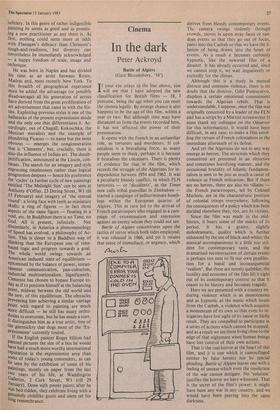Cinema
In the dark
Peter Ackroyd
Ifyour eye strays to the line above, you will see that I have adopted the new classification for British films — 18, I presume, being the age when you can enter the cinema legally. By strange chance it also happens to be the age of this film, within a year or two. But although time may have distanced us from the events recorded here, it has not affected the power of their presentation.
It opens with the French in an unfamiliar role, as torturers and murderers. If col- onialism is a brutalising force, as many people seem to think, perhaps it is because it brutalises the colonisers. There is plenty of evidence for that in the film, which records the struggle of the Algerians for in- dependence between 1954 and 1962. It was a peculiarly bloody conflict, in which FLN terrorists — or 'dissidents', as the Times now calls tribal guerrillas in Zimbabwe started a campaign of indiscriminate bomb- ings within the European quarter of Algiers. This in turn led to the arrival of French paratroopers who engaged in a cam- paign of extermination and repression against an enemy whom they could not see.
Battle of Algiers concentrates upon the tactics of terror which both sides employed; it was released in 1966, and yet it retains that sense of immediacy, or urgency, which
derives from bloody contemporary events. The camera swings violently through crowds, moves in upon stray faces or ran- dom events so that they go out of focus, peers into the Casbah so that we have the il- lusion of being drawn into the heart of events. As a result it becomes curiously hypnotic, like the newsreel film of a disaster. It has already occurred and, since we cannot stop it, we wait impatiently or excitedly for the climax.
Although this is a study in mutual distrust and common violence, there is no doubt that the director, Gillo Pontecorvo, displays a certain emotional commitment towards the Algerian rebels. That is understandable, I suppose, since the film was originally conceived by a leader of the FLN and has a script by a Marxist screenwriter (I must thank my colleague on the Observer for this information). It would have been difficult, in any case, to make a film extol- ling the virtues of French colonialism in the immediate aftermath of its defeat.
And yet the Algerians do not in any way emerge as heroes. The atrocities which they committed are presented in an objective and sometimes horrifying manner, and the occasional brutality of Islamic fundamen- talism is seen to be just as much a cause of violence as French militarism. But if there are no heroes, there are also no villains — the French paratroopers, led by Colonel Mathieu, are in the characteristic position of colonial troops everywhere; following the consequences of a policy which has been decided elsewhere they, too, are, its victims.
Since the film was made in the mid- Sixties, it bears some of the marks of its period. It has a grainy, slightly melodramatic, quality which is further enhanced by the use of black-and-white; the musical accompaniment is a little too stri- dent for contemporary taste, and the dramatised reconstruction of certain events is perhaps too neat to fit our own predilec- tion for a banal and inconsequential 'realism'. But these are merely quibbles; the lucidity and economy of the film lift it right out of its contemporary context so that it ceases to be history and becomes tragedy.
Here we are presented with a country en- during violence which is as monotonous and as hypnotic as the music which issues from the Casbah, a violence which acquires a momentum of its own so that even its in- stigators have lost sight of its cause or likely result. They are compelled to participate in a series of actions which cannot be stopped, and as a result we see them living close to the edge of that nightmare when human beings have lost control of their own actions.
That is the real horror at the heart of this film, and it is one which is camouflaged neither by false heroics nor by special pleading. Battle of Algiers leaves one with a feeling of unease which even the resolution of the war cannot mitigate. No 'solution' justifies the horror we have witnessed. That is the secret of the film's power: it might have been any war in any country, and we would have been peering into the same darkness.






































 Previous page
Previous page